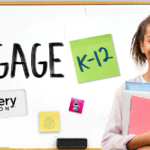By Rebecca Winkel
In my work directing workforce and education research and programs at the American Petroleum Institute (API), I support the natural gas and oil industry’s efforts to create good, family-supporting, career opportunities that provide meaningful work to everyone from chemists to construction workers. Through my work, I’ve had the wonderful opportunity to speak with business leaders and educators across the country about what is needed for success in our industry, and again and again, two common themes have emerged: these careers require foundational skills in science, technology, engineering and mathematics (STEM) across all education levels, and the basic knowledge that these career opportunities exist.
We’ve seen how these pieces are especially critical for groups such as women and students of color and others with limited access. For example, research we did seeking to understand women’s perceptions of the natural gas and oil industry found an astonishingly low number of women—only 3%—had ever applied to work in this industry, and the driving reason was a lack of awareness about what the industry does and related job opportunities. We also recognize that in the spectrum.
To be successful, everyone needs to have access to the educational opportunities that develop both the skillset and the awareness of the great careers offered in the natural gas and oil industry.
Enter the STEM Careers Coalition, which was developed to bridge STEM industries and K-12 classrooms at an unprecedented scale. A first-of-its-kind endeavor, the coalition connects partners representing natural gas and oil, manufacturing, aerospace, commercial and technology industries with Discovery Education in a unique initiative to prepare the next generation for the future of work by empowering them with STEM skills and career awareness. A key focus of this effort is to address the lack of diversity and unequal access to opportunity in the STEM workforce pipeline by providing real resources to under-resourced schools and through working to highlight career opportunities for students, parents and communities—especially the most vulnerable.
At API—the only national trade association representing all facets of the natural gas and oil industry, which supports 10.3 million U.S. jobs and nearly 8% of the U.S. economy—we see changes coming. Research by IHS Markit projects that the natural gas, oil and petrochemical industries will have millions of available jobs to fill over the next two decades. Many of these opportunities will result from a generation of retiring workers, who will take with them important pieces of institutional knowledge and industry know-how.
To fill this gap, it is critical that the future workforce is as prepared as possible. The changing demographics of the U.S. impact those efforts in a meaningful way. We know from the U.S. Census Bureau that “by 2044, more than half of all Americans are projected to belong to a minority group.” That means that attracting and retaining the best and brightest will be directly related to training and recruiting an increasingly diverse group of talent. Again, this brings us back to the K-12 space, where demonstrating the connection between the classroom and the real world can inspire students to build STEM skills, pursue fulfilling careers, and continue to use America’s energy abundance as a force for good.
A friend of mine has reminded me that while talent and genius are normally distributed among the population, resources and access are not, and API is working to change that. We know it’s a lofty goal, but with initiatives like the STEM Careers Coalition, we can start providing the opportunities needed to ensure that the best and brightest students from all backgrounds have foundational STEM skills and understand how can apply them in meaningful careers. At API, we know it’s not only a business imperative, it’s also the right thing to do.
Rebecca Winkel, Economic Advisor, American Petroleum Institute, is part of the Regulatory and Economic Policy team at API and directs research and programs related to workforce development and education, with a special focus on promoting the industry’s work with non-traditional allies. This includes topics such as employment, educational attainment, building trades and labor unions, supplier diversity, and workforce development issues for communities of color, women, veterans, and millennials. Ms. Winkel graduated summa cum laude with a bachelor’s degree in economics from Brigham Young University (BYU), and holds a Master’s in Public Policy from BYU.
The American Consortium for Equity in Education, publisher of the "Equity & Access" journal, celebrates and connects the educators, associations, community partners and industry leaders who are working to solve problems and create a more equitable environment for historically underserved pre K-12 students throughout the United States.
- American Consortium for Equity in Educationhttps://ace-ed.org/author/admin/
- American Consortium for Equity in Educationhttps://ace-ed.org/author/admin/April 23, 2025
- American Consortium for Equity in Educationhttps://ace-ed.org/author/admin/
- American Consortium for Equity in Educationhttps://ace-ed.org/author/admin/







